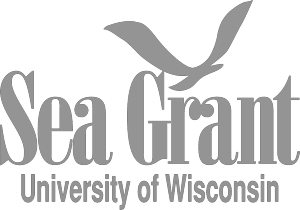The bluffs, beaches and harbor infrastructure of southeastern Wisconsin are vulnerable to coastal hazards including erosion, coastal storms and fluctuating water levels. These coastal hazards can threaten coastal properties and impair economic security of the region’s tourism and commerce. Planning, preparing for and adapting to coastal hazards can enhance community resilience and strengthen coastal economies. A project team consisting of the Wisconsin Coastal Management Program (WCMP), the University of Wisconsin Sea Grant Institute, the University of Wisconsin-Madison Department of Civil and Environmental Engineering, and the Southeastern Wisconsin Regional Planning Commission (SEWRPC) have been awarded a three-year NOAA Coastal Resilience Grant to enhance community capacity in southeastern Wisconsin to build resilience to these coastal hazards.
This project will provide resources and assistance to southeastern Wisconsin communities in Ozaukee, Milwaukee, Racine, and Kenosha Counties to plan and prepare for coastal hazards. To provide needed information on coastal hazards, the project team’s scientists and outreach specialists will evaluate and map shoreline recession rates in the region and develop educational resources on options to protect coastal assets. Using these resources, the project team will work with counties and municipalities to assess their vulnerabilities to coastal hazards, prioritize potential actions to address coastal hazards and begin to implement some of these actions with project funds. This effort will be organized as a coastal resilience community of practice for local officials, scientists and outreach specialists to learn about, share experiences with and develop approaches to plan and prepare for coastal hazards.
Funding
Funding for this project is provided by the National Atmospheric and Oceanic Administration (NOAA) Coastal Resilience Grants Program
Expected Outcomes
- Communities improve awareness of coastal hazard risks through shoreline recession mapping, guidance on risk-reduction practices, and community of practice meetings
- Property damages from coastal hazards are reduced by addressing identified and prioritized vulnerabilities with risk-reduction practices
- Coastal economic assets like beaches and harbors remain operational through improved planning and maintenance that considers hazard impacts
- Coastal risk-reduction efforts are more cost effective through multi-jurisdictional coordination and education on risk-reduction practices
Timeline
Organize a Community of Practice
| Year 1 | Organize participants in community of pactice including municipalities, counties, state agencies, and federal partners | WCMP, SEWRPC |
| Years 1-3 | Conduct semi-annual community of practice meetings to demonstrate resilience resources, discuss ongoing hazard issues, and initiate collaboration | All Partners |
| Year 3 | Evaluate community of practice to report on lessons learned and identify opportunities to continue collaboration beyond the project | WCMP |
Evaluate Shoreline Recession
| Year 1 | Analyze historic shoreline and bluff recession rates from aerial photographs | UW CEE |
| Year 2 | Assess scenarios of potential shoreline recession under lake level extremes and high-energy storm conditions | UW CEE |
| Year 3 | Develop interactive mapping tools to visualize recession rates and scenarios | UW CEE |
Create Guidance on Risk-Reduction Practices
| Year 1 | Develop outreach materials on bluff best management practices and bluff slope vegetation practices that can improve bluff stability | UWSGI |
| Year 2 | Develop outreach materials on nature-based shoreline practices for Great Lakes shorelines. | UWSGI |
| Update small harbor and marina infrastructure and dredging cost evaluation matrix for use in maintenance and adaptation planning | UWSGI | |
| Year 3 | Develop outreach materials on resilient beach restoration practices that increase resistance to erosion | UWSGI, WCMP |
Identify and Implement Local Resilience Opportunities
| Year 1 | Assess local vulnerability to coastal hazards with a self-assessment of coastal hazard issues and existing resilience actions | WCMP, UWSGI |
| Identify opportunities to increase coastal resilience through guided resilience assessment exercises | UWSGI, WCMP, SEWRPC | |
| Years 2-3 | Implement local projects with municipalities and counties to plan actions to reduce coastal hazard impacts | WCMP |
| Year 3 | Evaluate local resilience projects and report on lessons learned | WCMP |






